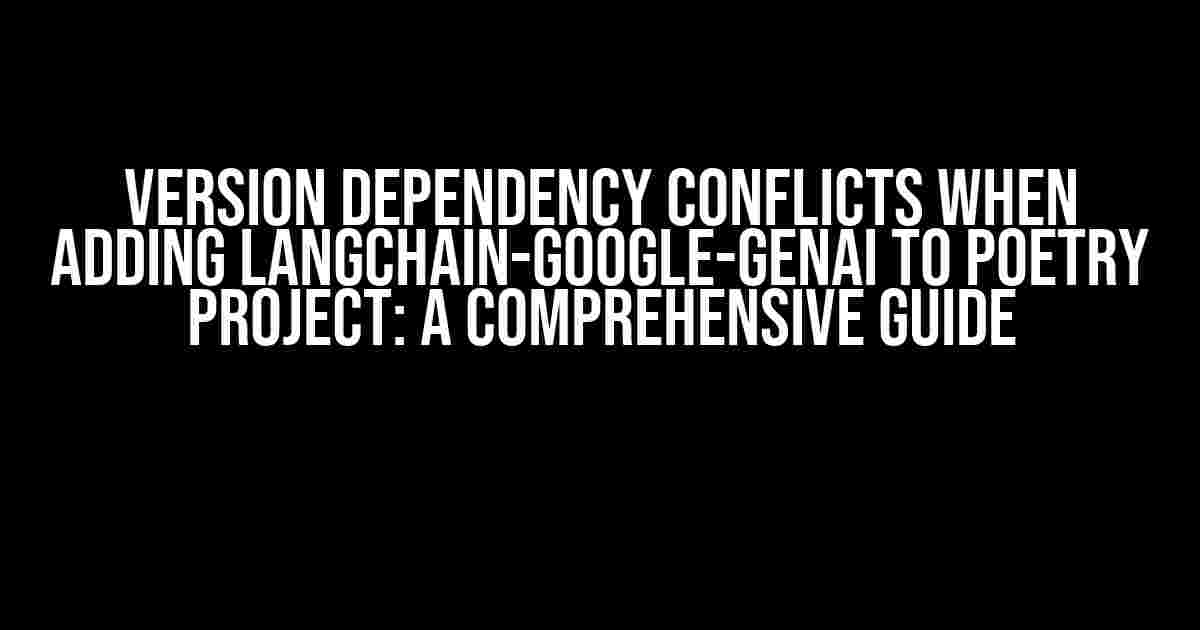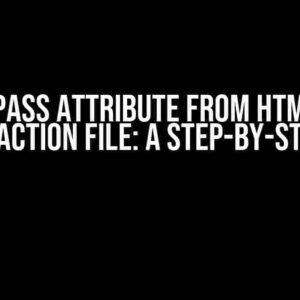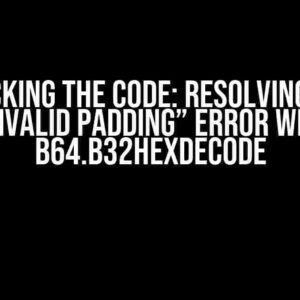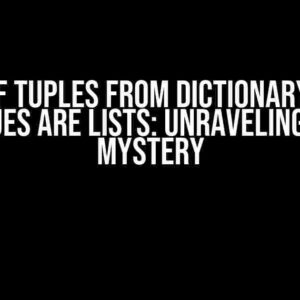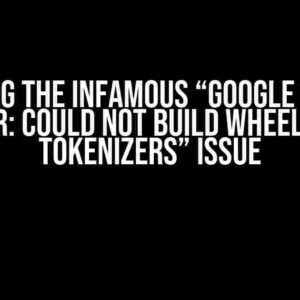Welcome to this in-depth guide on resolving version dependency conflicts when adding langchain-google-genai to your Poetry project. If you’re reading this, chances are you’ve stumbled upon the frustrating error messages that seem to appear out of nowhere, halting your development progress.
What is Langchain-Google-GenAI, and Why is it Important?
Langchain-Google-GenAI is an AI-powered language model that enables you to generate human-like text based on user input. It’s an incredible tool for building conversational AI, chatbots, and other natural language processing applications. With its impressive capabilities, it’s no wonder why developers are eager to integrate it into their projects.
However, as exciting as it is, adding langchain-google-genai to your Poetry project can lead to version dependency conflicts. These conflicts arise when different packages or libraries require different versions of the same dependency, causing a clash that prevents your project from functioning correctly.
Understanding Version Dependency Conflicts
A version dependency conflict occurs when:
- A package or library requires a specific version of a dependency.
- Another package or library requires a different version of the same dependency.
- The two versions are incompatible, causing a conflict.
In the case of langchain-google-genai, it often depends on specific versions of other packages, such as TensorFlow or PyTorch. When you add langchain-google-genai to your Poetry project, it may require a version of TensorFlow that’s incompatible with the version required by another package in your project.
Identifying the Problem: Error Messages and Logs
When you encounter a version dependency conflict, you’ll typically see error messages or warnings in your terminal or command prompt. These messages can be cryptic, but they often provide valuable information about the conflicting dependencies.
ERROR: Cannot install langchain-google-genai because these package versions have conflicting dependencies. langchain-google-genai 0.1.2 depends on tensorflow>=2.4.1<2.5.0 my-package 1.2.3 depends on tensorflow>=2.5.0<2.6.0
In this example, the error message indicates that langchain-google-genai requires TensorFlow version 2.4.1 or greater but less than 2.5.0, while my-package requires TensorFlow version 2.5.0 or greater but less than 2.6.0. This conflict prevents the installation of langchain-google-genai.
Resolving Version Dependency Conflicts: Strategies and Solutions
Now that we’ve identified the problem, let’s explore the strategies and solutions to resolve version dependency conflicts when adding langchain-google-genai to your Poetry project.
1. Check the Dependency Graph
Use Poetry’s built-in command `poetry show –tree` to visualize your project’s dependency graph. This will help you identify the conflicting dependencies and their relationships.
poetry show --tree
Examine the output to identify the dependencies required by langchain-google-genai and other packages in your project.
2. Use the `–extras` Flag
When installing langchain-google-genai, use the `–extras` flag to specify the required dependencies explicitly.
poetry add langchain-google-genai --extras="tensorflow[cpu]"
In this example, the `–extras` flag specifies that TensorFlow with CPU support is required. This can help resolve conflicts by ensuring that the correct version of TensorFlow is installed.
3. Pin Dependencies
Pinning dependencies means specifying exact versions of dependencies in your `pyproject.toml` file. This can help resolve conflicts by ensuring that the correct versions are used.
[tool.poetry.dependencies] langchain-google-genai = "^0.1.2" tensorflow = "^2.4.1"
In this example, the `pyproject.toml` file specifies exact versions of langchain-google-genai and TensorFlow. This ensures that the correct versions are used, reducing the likelihood of conflicts.
4. Use a Virtual Environment
Virtual environments can help isolate dependencies and reduce the risk of conflicts. Create a new virtual environment using Poetry’s `env` command.
poetry env use python3.9
Activate the virtual environment and install langchain-google-genai using Poetry’s `add` command.
poetry add langchain-google-genai
5. Update or Downgrade Dependencies
If pinning dependencies or using a virtual environment doesn’t resolve the conflict, you may need to update or downgrade dependencies to compatible versions.
poetry update tensorflow poetry add langchain-google-genai
In this example, the `update` command updates TensorFlow to the latest version, and then the `add` command installs langchain-google-genai.
Best Practices for Avoiding Version Dependency Conflicts
To avoid version dependency conflicts in the future, follow these best practices:
-
Keep your dependencies up-to-date by regularly running `poetry update`.
-
Use specific versions of dependencies in your `pyproject.toml` file.
-
Avoid using wildcard versions (e.g., `^2.4.1`) unless necessary.
-
Use virtual environments to isolate dependencies.
-
Regularly inspect your dependency graph using `poetry show –tree`.
| Best Practice | Reason |
|---|---|
| Keep dependencies up-to-date | Ensures you have the latest compatible versions |
| Use specific versions | Reduces the risk of conflicts due to version mismatches |
| Avoid wildcard versions | Prevents unexpected version updates that may cause conflicts |
| Use virtual environments | Isolates dependencies, reducing the risk of conflicts |
| Regularly inspect the dependency graph | Helps identify potential conflicts before they occur |
By following these best practices, you’ll be better equipped to avoid version dependency conflicts and ensure a smooth development experience when adding langchain-google-genai to your Poetry project.
Conclusion
Version dependency conflicts can be frustrating, but with the right strategies and solutions, you can overcome them. By understanding the causes of conflicts, identifying the problem, and applying the solutions outlined in this guide, you’ll be able to successfully add langchain-google-genai to your Poetry project.
Remember to stay vigilant, keep your dependencies up-to-date, and regularly inspect your dependency graph to avoid conflicts in the future. Happy coding!
Frequently Asked Question
Get clarity on version dependency conflicts when adding langchain-google-genai to your Poetry project with these frequently asked questions!
What causes version dependency conflicts when adding langchain-google-genai to my Poetry project?
Version dependency conflicts occur when the dependencies required by langchain-google-genai are incompatible with the dependencies in your Poetry project. This can happen when different packages rely on different versions of the same library, causing conflicts and errors.
How can I identify the conflicting dependencies in my Poetry project?
You can use the `poetry show` command to list the dependencies in your project, and then check for any version conflicts. You can also use the `poetry diagnose` command to identify any potential issues with your dependencies.
How can I resolve version dependency conflicts in my Poetry project?
You can resolve version dependency conflicts by specifying compatible versions of the conflicting dependencies in your `pyproject.toml` file. You can also use dependency resolvers like `poetry` or `pip-compile` to help manage your dependencies and avoid conflicts.
Can I use a virtual environment to isolate my dependencies and avoid conflicts?
Yes, using a virtual environment can help isolate your dependencies and avoid conflicts. You can create a virtual environment using tools like `poetry env` or `venv`, and then install your dependencies within that environment.
Are there any best practices for managing dependencies in a Poetry project?
Yes, some best practices for managing dependencies in a Poetry project include using semantic versioning, specifying exact versions of dependencies, and regularly updating your dependencies to avoid conflicts.

